 In a time of burnings and bombings Heaney used poetry to offer an alternative world; he gave example by his seriousness, his honesty, his thoughtfulness, his generosity Two years ago I invited Seamus Heaney to read at the Kilkenny arts festival in Ireland. The venue was St Canice’s Cathedral, one of the most beautiful churches in Ireland. It was here almost 40 years earlier that, as a young poet, he had met Robert Lowell, who had become a friend and a mentor. Heaney admired Lowell’s utter dedication to his craft, his ability to change, his absolute belief in the importance of poetry. When I suggested that Dennis O’Driscoll, who had done a book of interviews with Heaney, should introduce him on stage, Seamus said he would like that, but he would prefer it if Dennis would read as well. Dennis, he said, had done enough introducing; since he was also a poet, he should get equal billing. It was typical of Seamus’s generosity. That evening, I suggested to him that he should do no signing of books after the reading, but go and have a drink with the theatre director Peter Brook, who was in Kilkenny and wanted to meet him. As we left by a side door and walked away from the church, he sighed and said that all his life after readings when everyone else was free to walk out into the world, he would spent an hour or more signing books and meeting people. He was the most tactful and careful and scrupulous of men. He used a deep-rooted conscientiousness in his work, but it also came across every time you met him. He had a way of holding back, watching every word, weighing the moment. In his public readings he had a real command; privately, he was almost shy, always thoughtful.
In a time of burnings and bombings Heaney used poetry to offer an alternative world; he gave example by his seriousness, his honesty, his thoughtfulness, his generosity Two years ago I invited Seamus Heaney to read at the Kilkenny arts festival in Ireland. The venue was St Canice’s Cathedral, one of the most beautiful churches in Ireland. It was here almost 40 years earlier that, as a young poet, he had met Robert Lowell, who had become a friend and a mentor. Heaney admired Lowell’s utter dedication to his craft, his ability to change, his absolute belief in the importance of poetry. When I suggested that Dennis O’Driscoll, who had done a book of interviews with Heaney, should introduce him on stage, Seamus said he would like that, but he would prefer it if Dennis would read as well. Dennis, he said, had done enough introducing; since he was also a poet, he should get equal billing. It was typical of Seamus’s generosity. That evening, I suggested to him that he should do no signing of books after the reading, but go and have a drink with the theatre director Peter Brook, who was in Kilkenny and wanted to meet him. As we left by a side door and walked away from the church, he sighed and said that all his life after readings when everyone else was free to walk out into the world, he would spent an hour or more signing books and meeting people. He was the most tactful and careful and scrupulous of men. He used a deep-rooted conscientiousness in his work, but it also came across every time you met him. He had a way of holding back, watching every word, weighing the moment. In his public readings he had a real command; privately, he was almost shy, always thoughtful.
Continue Reading →
 தமிழில் எழுதப்பட்ட இலக்கணங்களை மரபிலக்கணங்கள், நவீன இலக்கணங்கள் எனப் பாகுபடுத்திப் பார்ப்பது பெரும்பான்மையான ஆய்வறிஞர்களின் துணிபு. அவற்றுள் மரபிலக்கணங்களைப் பட்டியலிட இருபதாம் நூற்றாண்டுக்குள் எழுதப்பட்டிருக்க வேண்டும்(2010:112), நூற்பா வடிவில் அமைந்திருக்க வேண்டும்(2010:299-300) என்பது இலக்கணவியல் அறிஞரின் கருத்து. அதாவது அறுவகை இலக்கணம் வரை எழுதப்பட்ட நூல்களை மரபிலக்கணங்களிலும், பிறவற்றை நவீன இலக்கணங்களிலும் வைக்கலாம் என்பது அவ்வறிஞரின் கருத்தாகப் புலப்படுகிறது. அக்கருத்து மரபிலக்கணக் காலநீட்சியை அறிவதற்கான கருதுகோள்கள் எனில், ஏழாம் இலக்கணத்தையும் மரபிலக்கண வரிசையில் வத்துப் பார்ப்பதே பொருத்தமுடையதாக இருக்கும். ஆக, ஏழாம் இலக்கணம் மரபா? அல்லது நவீனமா? என அறிவதாக இக்கட்டுரை அமைகிறது.
தமிழில் எழுதப்பட்ட இலக்கணங்களை மரபிலக்கணங்கள், நவீன இலக்கணங்கள் எனப் பாகுபடுத்திப் பார்ப்பது பெரும்பான்மையான ஆய்வறிஞர்களின் துணிபு. அவற்றுள் மரபிலக்கணங்களைப் பட்டியலிட இருபதாம் நூற்றாண்டுக்குள் எழுதப்பட்டிருக்க வேண்டும்(2010:112), நூற்பா வடிவில் அமைந்திருக்க வேண்டும்(2010:299-300) என்பது இலக்கணவியல் அறிஞரின் கருத்து. அதாவது அறுவகை இலக்கணம் வரை எழுதப்பட்ட நூல்களை மரபிலக்கணங்களிலும், பிறவற்றை நவீன இலக்கணங்களிலும் வைக்கலாம் என்பது அவ்வறிஞரின் கருத்தாகப் புலப்படுகிறது. அக்கருத்து மரபிலக்கணக் காலநீட்சியை அறிவதற்கான கருதுகோள்கள் எனில், ஏழாம் இலக்கணத்தையும் மரபிலக்கண வரிசையில் வத்துப் பார்ப்பதே பொருத்தமுடையதாக இருக்கும். ஆக, ஏழாம் இலக்கணம் மரபா? அல்லது நவீனமா? என அறிவதாக இக்கட்டுரை அமைகிறது.
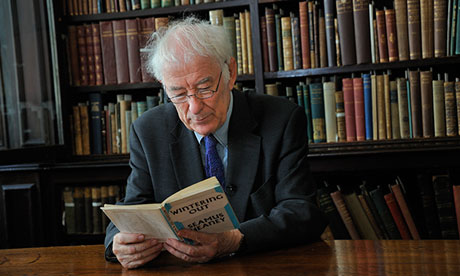
 In a time of burnings and bombings Heaney used poetry to offer an alternative world; he gave example by his seriousness, his honesty, his thoughtfulness, his generosity Two years ago I invited Seamus Heaney to read at the Kilkenny arts festival in Ireland. The venue was St Canice’s Cathedral, one of the most beautiful churches in Ireland. It was here almost 40 years earlier that, as a young poet, he had met Robert Lowell, who had become a friend and a mentor. Heaney admired Lowell’s utter dedication to his craft, his ability to change, his absolute belief in the importance of poetry. When I suggested that Dennis O’Driscoll, who had done a book of interviews with Heaney, should introduce him on stage, Seamus said he would like that, but he would prefer it if Dennis would read as well. Dennis, he said, had done enough introducing; since he was also a poet, he should get equal billing. It was typical of Seamus’s generosity. That evening, I suggested to him that he should do no signing of books after the reading, but go and have a drink with the theatre director Peter Brook, who was in Kilkenny and wanted to meet him. As we left by a side door and walked away from the church, he sighed and said that all his life after readings when everyone else was free to walk out into the world, he would spent an hour or more signing books and meeting people. He was the most tactful and careful and scrupulous of men. He used a deep-rooted conscientiousness in his work, but it also came across every time you met him. He had a way of holding back, watching every word, weighing the moment. In his public readings he had a real command; privately, he was almost shy, always thoughtful.
In a time of burnings and bombings Heaney used poetry to offer an alternative world; he gave example by his seriousness, his honesty, his thoughtfulness, his generosity Two years ago I invited Seamus Heaney to read at the Kilkenny arts festival in Ireland. The venue was St Canice’s Cathedral, one of the most beautiful churches in Ireland. It was here almost 40 years earlier that, as a young poet, he had met Robert Lowell, who had become a friend and a mentor. Heaney admired Lowell’s utter dedication to his craft, his ability to change, his absolute belief in the importance of poetry. When I suggested that Dennis O’Driscoll, who had done a book of interviews with Heaney, should introduce him on stage, Seamus said he would like that, but he would prefer it if Dennis would read as well. Dennis, he said, had done enough introducing; since he was also a poet, he should get equal billing. It was typical of Seamus’s generosity. That evening, I suggested to him that he should do no signing of books after the reading, but go and have a drink with the theatre director Peter Brook, who was in Kilkenny and wanted to meet him. As we left by a side door and walked away from the church, he sighed and said that all his life after readings when everyone else was free to walk out into the world, he would spent an hour or more signing books and meeting people. He was the most tactful and careful and scrupulous of men. He used a deep-rooted conscientiousness in his work, but it also came across every time you met him. He had a way of holding back, watching every word, weighing the moment. In his public readings he had a real command; privately, he was almost shy, always thoughtful.
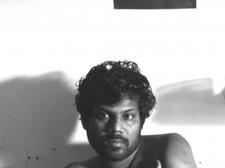
 The Best Untranslated Writers series – in which established writers select and showcase fellow writers from their own languages who are not yet widely translated or read – began with a trio of Brazilians on the writers they love most but are yet to make the leap into English. Today V.V. Ganeshananthan introduces us to Shobaskathi, also known as Anthony X, who writes about Sri Lanka and its diaspora communities, and who was previously involved in the Liberation Tigers of Tamil Eelam. Shobasakthi is also known as Anthony X; he is an ex-militant; he is an expatriate. Based in France, he writes about Sri Lanka in Tamil, his native language (and the native language of my parents). I read Tamil, but not yet well enough to get through the original versions of his books; instead, I use popular English translations by Anushiya Ramaswamy. I finished his novel Gorilla very shortly before meeting him; I read another, Traitor, many years after that initial conversation.
The Best Untranslated Writers series – in which established writers select and showcase fellow writers from their own languages who are not yet widely translated or read – began with a trio of Brazilians on the writers they love most but are yet to make the leap into English. Today V.V. Ganeshananthan introduces us to Shobaskathi, also known as Anthony X, who writes about Sri Lanka and its diaspora communities, and who was previously involved in the Liberation Tigers of Tamil Eelam. Shobasakthi is also known as Anthony X; he is an ex-militant; he is an expatriate. Based in France, he writes about Sri Lanka in Tamil, his native language (and the native language of my parents). I read Tamil, but not yet well enough to get through the original versions of his books; instead, I use popular English translations by Anushiya Ramaswamy. I finished his novel Gorilla very shortly before meeting him; I read another, Traitor, many years after that initial conversation.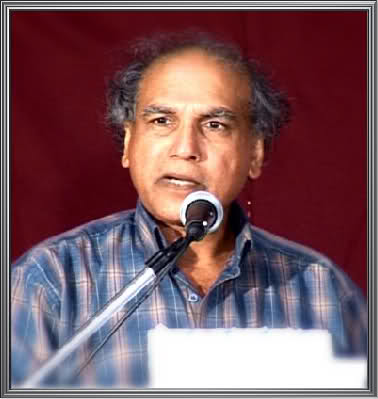

 இதமான கடற்காற்று…. ஆர்ப்பரிக்கும் கடல்… அந்தக்காற்றை சுவாசித்தவாறும் கடலோசையை கேட்டவாறும் மாலையில் சூரிய அஸ்த்தமனத்தின் அற்புதக்காட்சியை ரசித்தவாறும் தனது தாத்தா, பாட்டி, தாய், தந்தை, அக்கா, தங்கை, தம்பிமாருடன் மனிதநேயத்துடனும் எண்ணற்ற கனவுகளுடனும் வாழ்ந்து வளர்ந்த இளைஞன், அந்தக்கடற்கரையோர நகரத்தில் தமிழ் சார்ந்த பல பணிகளில் ஊர்மக்களுடன் இணைந்திருந்தான். தனது ஆரம்பக்கல்விக்கு துணையாக நின்ற பாடசாலையிலும் அதற்கு வித்திட்ட வெகுஜன அமைப்பான இந்து இளைஞர் மன்றத்திலும் இயல், இசை, நாடகத்தின் வளர்ச்சிக்கு பக்கபலமாக நின்றான். பாடசாலை பழைய மாணவர் மன்றத்தை உருவாக்குவதிலும் அதன் ஊடாக மாணவரிடையே ஊக்குவிப்பு போட்டிகளை நடத்துவதிலும் உறுப்பினர்களுடன் இணைந்திருந்தான். இவ்வாறு இலங்கையின் மேற்கே தமிழ் அலைகள் ஆர்ப்பரிக்க, அதில் தன்னாற்றலால் நீச்சலிட்டது வரவேற்கத்தக்கது. ஆனால் ஆச்சரியப்படத்தக்கது அல்ல. உள்ளார்ந்த படைப்பிலக்கவாதி எங்கிருந்தாலும் அப்படித்தானிருப்பான். அவனுக்கு எழுத்தின்மீதும் வாசிப்பின் மீதும் பற்றுதல் அதிகம். பெற்றவர்களின் கனவு வேறுவிதமாக இருக்க அவனோ தனது கனவை வேறுவிதமாக வளர்த்து நனவாக்கிக்கொள்ள முயன்றான். அவனது உழைப்பு வீண்போகவில்லை. தான் நேசித்த கடல் மாந்தர்கள் பற்றிய கதைகளையே முதலில் எழுதி முதல் தொகுப்பிற்கு தேசிய சாகித்திய விருதையும் பாராட்டுக்களையும் பெற்றுக்கொண்டான்.
இதமான கடற்காற்று…. ஆர்ப்பரிக்கும் கடல்… அந்தக்காற்றை சுவாசித்தவாறும் கடலோசையை கேட்டவாறும் மாலையில் சூரிய அஸ்த்தமனத்தின் அற்புதக்காட்சியை ரசித்தவாறும் தனது தாத்தா, பாட்டி, தாய், தந்தை, அக்கா, தங்கை, தம்பிமாருடன் மனிதநேயத்துடனும் எண்ணற்ற கனவுகளுடனும் வாழ்ந்து வளர்ந்த இளைஞன், அந்தக்கடற்கரையோர நகரத்தில் தமிழ் சார்ந்த பல பணிகளில் ஊர்மக்களுடன் இணைந்திருந்தான். தனது ஆரம்பக்கல்விக்கு துணையாக நின்ற பாடசாலையிலும் அதற்கு வித்திட்ட வெகுஜன அமைப்பான இந்து இளைஞர் மன்றத்திலும் இயல், இசை, நாடகத்தின் வளர்ச்சிக்கு பக்கபலமாக நின்றான். பாடசாலை பழைய மாணவர் மன்றத்தை உருவாக்குவதிலும் அதன் ஊடாக மாணவரிடையே ஊக்குவிப்பு போட்டிகளை நடத்துவதிலும் உறுப்பினர்களுடன் இணைந்திருந்தான். இவ்வாறு இலங்கையின் மேற்கே தமிழ் அலைகள் ஆர்ப்பரிக்க, அதில் தன்னாற்றலால் நீச்சலிட்டது வரவேற்கத்தக்கது. ஆனால் ஆச்சரியப்படத்தக்கது அல்ல. உள்ளார்ந்த படைப்பிலக்கவாதி எங்கிருந்தாலும் அப்படித்தானிருப்பான். அவனுக்கு எழுத்தின்மீதும் வாசிப்பின் மீதும் பற்றுதல் அதிகம். பெற்றவர்களின் கனவு வேறுவிதமாக இருக்க அவனோ தனது கனவை வேறுவிதமாக வளர்த்து நனவாக்கிக்கொள்ள முயன்றான். அவனது உழைப்பு வீண்போகவில்லை. தான் நேசித்த கடல் மாந்தர்கள் பற்றிய கதைகளையே முதலில் எழுதி முதல் தொகுப்பிற்கு தேசிய சாகித்திய விருதையும் பாராட்டுக்களையும் பெற்றுக்கொண்டான்.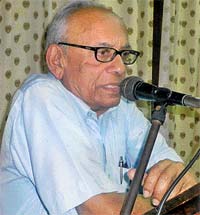
 “ஒரு நபர் தனக்காக மட்டும் பாடுபட்டால், ஒரு வேளை பிரபலமான அறிவாளியாகலாம். மாபெரும் ஞானியாகலாம், மிகச்சிறந்த கவிஞராகலாம், ஆனால் உண்மையான மனிதராக முடியாது” என தனது பள்ளிப்பருவத்திலே எழுதியவர் காரல் மார்க்ஸ். சக மனிதர்கள் குறித்தும் அம்மனிதர்களின் வாழ்வுக் குறித்தும் உயரிய நிலையில் சிந்தித்து செயலாற்றியமையே வரலாற்றினுடைய மனிதராக அவர் போற்றப்படுவதற்கான அடிப்படையாகும். மனித குல வளர்ச்சிப் போக்க்pல் அறிவு என்பது சமுதாயம் சார்ந்த விடயமாகும். எனவே அவ்வறிவு எப்போதும் விஞ்ஞானம் தழுவியதாக அமைந்திருப்பதுடன் செருக்ககோ நேர்மையீனமோ இல்லாது சமூக வளர்ச்சியை முன்னெடுத்து செல்வதாக அது அமைந்துக் காணப்படுகின்றது. பிரம்ஜி என்ற ஆளுமையின் பணிநலன் பாரட்டு நிகழ்வு குறித்த சிந்திக்கின்ற போது மேற்கறிக்க வரிகள் ஞாபகத்திற்கு வருகின்றன.
“ஒரு நபர் தனக்காக மட்டும் பாடுபட்டால், ஒரு வேளை பிரபலமான அறிவாளியாகலாம். மாபெரும் ஞானியாகலாம், மிகச்சிறந்த கவிஞராகலாம், ஆனால் உண்மையான மனிதராக முடியாது” என தனது பள்ளிப்பருவத்திலே எழுதியவர் காரல் மார்க்ஸ். சக மனிதர்கள் குறித்தும் அம்மனிதர்களின் வாழ்வுக் குறித்தும் உயரிய நிலையில் சிந்தித்து செயலாற்றியமையே வரலாற்றினுடைய மனிதராக அவர் போற்றப்படுவதற்கான அடிப்படையாகும். மனித குல வளர்ச்சிப் போக்க்pல் அறிவு என்பது சமுதாயம் சார்ந்த விடயமாகும். எனவே அவ்வறிவு எப்போதும் விஞ்ஞானம் தழுவியதாக அமைந்திருப்பதுடன் செருக்ககோ நேர்மையீனமோ இல்லாது சமூக வளர்ச்சியை முன்னெடுத்து செல்வதாக அது அமைந்துக் காணப்படுகின்றது. பிரம்ஜி என்ற ஆளுமையின் பணிநலன் பாரட்டு நிகழ்வு குறித்த சிந்திக்கின்ற போது மேற்கறிக்க வரிகள் ஞாபகத்திற்கு வருகின்றன.
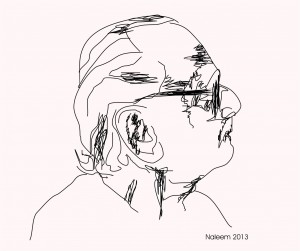
 [‘மல்லிகை; சஞ்சிகையின் வெளியீட்டாளரும், ஆசிரியரும், எழுத்தாளருமான டொமினிக் ஜீவா அவர்களுக்கு ஜூன் 27 அன்று வயது எண்பத்தியேழு. அவரது பிறந்த தினத்தையொட்டி ‘எதுவரை.நெட்’ இணைய இதழில் வெளியான இக்கட்டுரை நன்றியுடன் மீள்பிரசுமாகின்றது. – பதிவுகள் -]
[‘மல்லிகை; சஞ்சிகையின் வெளியீட்டாளரும், ஆசிரியரும், எழுத்தாளருமான டொமினிக் ஜீவா அவர்களுக்கு ஜூன் 27 அன்று வயது எண்பத்தியேழு. அவரது பிறந்த தினத்தையொட்டி ‘எதுவரை.நெட்’ இணைய இதழில் வெளியான இக்கட்டுரை நன்றியுடன் மீள்பிரசுமாகின்றது. – பதிவுகள் -]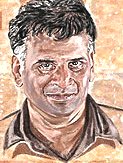
 [அண்மையில் பதிவுகள் இணைய இதழில் வெளியான ‘பிரமிளின் தவளைக் கவிதை பற்றியதொரு புரிதல்’ என்னும் எனது கட்டுரையில் ‘தவளைக் கவிதை’ பற்றிய எனது புரிதலை எழுதியிருந்தேன். அது பற்றிய ஜெயமோகனுக்கு எழுதிய கடிதத்திற்கு ஜெயமோகன் அளித்துள்ள பதிற் கடிதம் ஒரு பதிவுக்காக இங்கு பிரசுரமாகின்றது. – வ.ந.கி -] ஒரு கவிதையை வாசிக்க குறைந்தபட்ச வாசிப்பு அதிகபட்ச வாசிப்பு என இரு தளங்களை உருவாக்கிக்கொள்வது பயனளிக்கும் என்பது என் எண்ணம். குறைந்தபட்ச வாசிப்பு என்பது அந்தக்கவிதை உருவான மொழி-பண்பாட்டுச்சூழலில் கவிதையின் வரிகள் மூலம் பொதுவாக அடையச்சாத்தியமான அர்த்தம். அந்த மொழி-பண்பாட்டுச்சூழலில் உள்ள, கவிதையின் தனிமொழியை கற்பனைமூலம் விரித்து அறியும் பயிற்சி கொண்ட எல்லா கவிதைவாசகர்களும் ஏறத்தாழ அடையக்கூடிய வாசிப்பு அது. ஒரு வகுப்பில், ஒரு விவாதக்கூடத்தில், ஓர் வாசிப்பரங்கில் எப்போதும் அந்த குறைந்தபட்ச வாசிப்பைத்தான் முதலில் முன்வைக்க முடியும். இந்த வரிகள் இவ்வாறெல்லாம் பொருள் அளிக்கின்றன, ஒட்டுமொத்தமாக இக்கவிதை இந்தப் பொருளை, இந்த உணர்வை, இந்த தரிசனத்தை அளிக்கிறது என்று சொல்லலாம். அப்படிச் சொன்னதுமே அதை அங்குள்ள ஒவ்வொருவரும் தாண்ட ஆரம்பித்துவிடுவார்கள். அவர்களின் தனிப்பட்ட வாசிப்பைச் சொல்ல ஆரம்பித்துவிடுவார்கள். அதைத்தான் அதிகபட்ச வாசிப்பு என்கிறேன்.
[அண்மையில் பதிவுகள் இணைய இதழில் வெளியான ‘பிரமிளின் தவளைக் கவிதை பற்றியதொரு புரிதல்’ என்னும் எனது கட்டுரையில் ‘தவளைக் கவிதை’ பற்றிய எனது புரிதலை எழுதியிருந்தேன். அது பற்றிய ஜெயமோகனுக்கு எழுதிய கடிதத்திற்கு ஜெயமோகன் அளித்துள்ள பதிற் கடிதம் ஒரு பதிவுக்காக இங்கு பிரசுரமாகின்றது. – வ.ந.கி -] ஒரு கவிதையை வாசிக்க குறைந்தபட்ச வாசிப்பு அதிகபட்ச வாசிப்பு என இரு தளங்களை உருவாக்கிக்கொள்வது பயனளிக்கும் என்பது என் எண்ணம். குறைந்தபட்ச வாசிப்பு என்பது அந்தக்கவிதை உருவான மொழி-பண்பாட்டுச்சூழலில் கவிதையின் வரிகள் மூலம் பொதுவாக அடையச்சாத்தியமான அர்த்தம். அந்த மொழி-பண்பாட்டுச்சூழலில் உள்ள, கவிதையின் தனிமொழியை கற்பனைமூலம் விரித்து அறியும் பயிற்சி கொண்ட எல்லா கவிதைவாசகர்களும் ஏறத்தாழ அடையக்கூடிய வாசிப்பு அது. ஒரு வகுப்பில், ஒரு விவாதக்கூடத்தில், ஓர் வாசிப்பரங்கில் எப்போதும் அந்த குறைந்தபட்ச வாசிப்பைத்தான் முதலில் முன்வைக்க முடியும். இந்த வரிகள் இவ்வாறெல்லாம் பொருள் அளிக்கின்றன, ஒட்டுமொத்தமாக இக்கவிதை இந்தப் பொருளை, இந்த உணர்வை, இந்த தரிசனத்தை அளிக்கிறது என்று சொல்லலாம். அப்படிச் சொன்னதுமே அதை அங்குள்ள ஒவ்வொருவரும் தாண்ட ஆரம்பித்துவிடுவார்கள். அவர்களின் தனிப்பட்ட வாசிப்பைச் சொல்ல ஆரம்பித்துவிடுவார்கள். அதைத்தான் அதிகபட்ச வாசிப்பு என்கிறேன்.
 ‘எரிந்து கொண்டிருக்கும் நேரம்’ என்னும் கவிஞர் சேரனின் கவிதைகளை லக்சுமி ஹாம்ஸ்றம் (Laksmi Holmstrom) அவர்களின் மொழிபெயர்ப்பில் ‘ஆர்க்’ வெளியீட்டகம் வெளியிட்டிருந்தது. இதற்காக அப்பதிப்பகத்துக்கு இங்கிலாந்துப் பேனா அமைப்பினரின் (PEN – UK) மொழிபெயர்ப்பு நூல்களுக்கான 2012ற்குரிய விருது கிடைத்துள்ளது. லக்சுமி ஹாம்ஸ்றம் அவ்ர்களுக்குக் கனடாவின் 2007ற்கான இயல்விருது கிடைத்துள்ளதும் குறிப்பிடத்தக்கது. அந்த விருது கிடைத்தபோது எழுத்தாளர் ஜெயமோகன் மிகவும் கடுமையாக அந்த விருதினையும், லக்சுமி ஹாம்ஸ்றம் அவர்களின் அதற்கான தகுதி பற்றியும், அவரை அவ்விருதுக்குத் தேர்ந்தெடுத்த நடுவர்கள் பற்றியும் விமர்சித்துத் தனது வலைப்பதிவில் எழுதியிருந்தார். அந்நடுவர்களில் நானுமொருவனாக இருந்ததனால் அது பற்றி பதிவுகள் இணைய இதழில் எழுதிய பதில் கட்டுரைகளிலொன்றினை ஒரு பதிவுக்காக இம்முறை வாசிப்பும், யோசிப்பும் பகுதியில் பகிர்ந்துகொள்கின்றேன்.
‘எரிந்து கொண்டிருக்கும் நேரம்’ என்னும் கவிஞர் சேரனின் கவிதைகளை லக்சுமி ஹாம்ஸ்றம் (Laksmi Holmstrom) அவர்களின் மொழிபெயர்ப்பில் ‘ஆர்க்’ வெளியீட்டகம் வெளியிட்டிருந்தது. இதற்காக அப்பதிப்பகத்துக்கு இங்கிலாந்துப் பேனா அமைப்பினரின் (PEN – UK) மொழிபெயர்ப்பு நூல்களுக்கான 2012ற்குரிய விருது கிடைத்துள்ளது. லக்சுமி ஹாம்ஸ்றம் அவ்ர்களுக்குக் கனடாவின் 2007ற்கான இயல்விருது கிடைத்துள்ளதும் குறிப்பிடத்தக்கது. அந்த விருது கிடைத்தபோது எழுத்தாளர் ஜெயமோகன் மிகவும் கடுமையாக அந்த விருதினையும், லக்சுமி ஹாம்ஸ்றம் அவர்களின் அதற்கான தகுதி பற்றியும், அவரை அவ்விருதுக்குத் தேர்ந்தெடுத்த நடுவர்கள் பற்றியும் விமர்சித்துத் தனது வலைப்பதிவில் எழுதியிருந்தார். அந்நடுவர்களில் நானுமொருவனாக இருந்ததனால் அது பற்றி பதிவுகள் இணைய இதழில் எழுதிய பதில் கட்டுரைகளிலொன்றினை ஒரு பதிவுக்காக இம்முறை வாசிப்பும், யோசிப்பும் பகுதியில் பகிர்ந்துகொள்கின்றேன்.